Reginald SchiveReggie performed with the King Band starting in 1946 and has been the conductor of that ensemble from 1977 until 2003 when he retired from that position. Reggie died in 2004. |
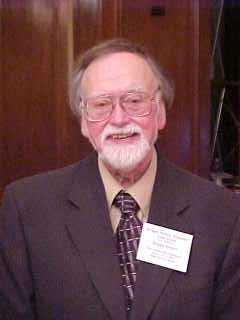 |
Reginald SchiveReggie performed with the King Band starting in 1946 and has been the conductor of that ensemble from 1977 until 2003 when he retired from that position. Reggie died in 2004. |
 |
We lived in Fort Dodge close to the park where the King Band would play in the old gazebo. When I was very young we would go to the park to enjoy the concerts, which led my mom to say that I started conducting the Karl King Band when I was two years old.
In 1945 (I was a freshman in high school) my friend and I got jobs downtown. He worked at a clothier, and I got a job at the Ruth King Music Shoppe. Lois King (wife of Karl Jr.) managed the store and checked to see if I did my job. My duties included sweeping and mopping the floors and dusting the boxes which held the music. These were the old cardboard boxes with the tilting fronts. We had 450 of those boxes! The store was pretty large with a wide hallway in front. In the back, Mr. King had a room for the King Music Company. The music was not printed there, but that's where he ran the business.
One day my friend working at the clothier found a hundred dollar bill on the floor. After work the two of us talked about whether he should keep the money or whether he should turn it in. My friend said he decided to turn it in because the owner might be testing him to see if he could be trusted. You did the right thing, I told him.
Later, while taking out the trash at the music store, I found a pencil score of the King Henry march (dedicated to Henry Fillmore). I then wondered if I, too, was being tested. So I took the score inside to Mr. King who told me No, I don't need that!
I wish now I'd been bold enough to ask him if I could keep it.
I played clarinet in the King Band while I was still in high school. I remember playing some old tough overture when Carl Pray, sitting behind me, leaned forward to tap on my shoulder.
He said, If you can't play that, you better practice it or get the hell out of the band!
We rookies were called the First of May'ers by the old guys in the band.
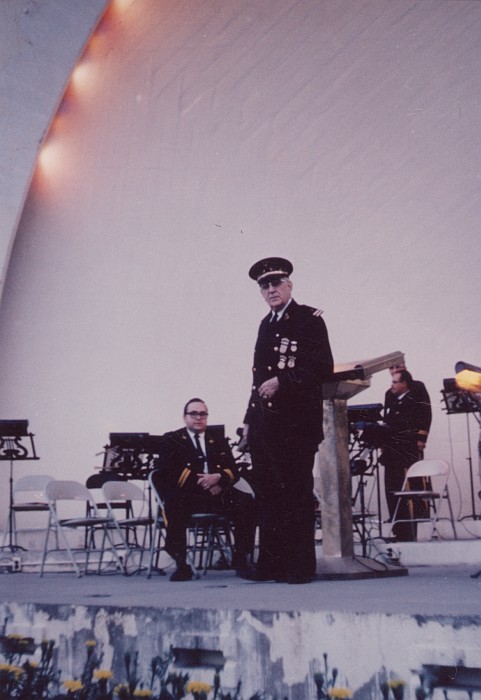
1961 photo of Karl King with his first clarinetist, Reggie Schive
Karl didn't need a score and didn't originally write one for his marches. I was honored to be asked by Mrs. King to write several piano scores for a number of his marches (after his death).
Mr. King was a humble man and very generous. Circus people would often come by and Karl made sure they would have a meal. I also remember Karl eating with the Great Walendas ate at their living quarters at the fair.
Once when Bill Spielberg (first horn in the Barnum and Bailey's Band) needed help, Karl gave him a job at the store as manager of the record department. This was when there was room at the store where you could listen to records to see if you wanted to buy them.
Bill had a German accent and wore a monocle. When my young jazz friends would come into the store and listen to records, Bill would say, You Veasals, You never buy anything! (He pronounced the W with a German V sound).
The band would practice in the old band hall above the harness shop on South 6th Street where there was a room in the back with a bed and sink. This was where Bill Spielberg stayed. We would come early to practice and play Pitch with Bill and Emil Mobius (the band librarian). Emil thought pranks were funny unless they were directed at him.
I heard that one very hot day at the Iowa State Fair when Emil carried the heavy library case from where the band stayed all the way to the gazebo for the performance, only to find that the case was full of elephant dung!
We couldn't leave the State Fair until after the 200 lap stock car race had started because we played right before that race. When we were ready to pull out, there was lots of traffic and pandimonium but Walt Engelbart jumped out of the lead car and directed traffic in his black King Band uniform (which looked a lot like a police uniform). He got the cars carrying the King Band out quickly and jumped into the last one and we were off.
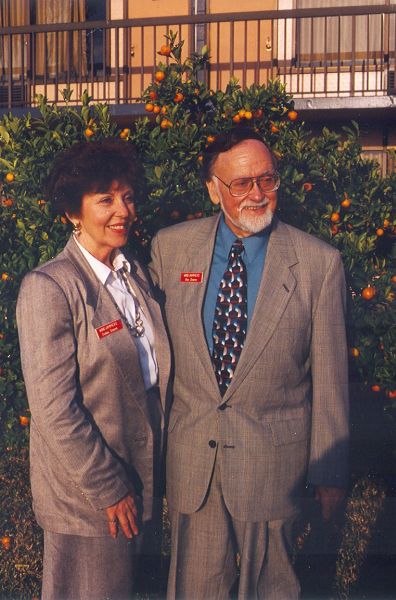
When the King Band was playing at the Buena Vista County Fair in Alta, my wife and I had Mr. King over to our house for dinner of corn on the cob. It was so very hot that Mr. King removed his shirt and was wearing an old-fashioned sleeveless undershirt.
Karl said, Don't tell Mrs. King I took off my shirt!
Karl always got his shave at Dillman's Barber Shop. There was always lots of visiting there reminding me of Floyd's Barber Shop on the Andy Griffith Show.
One of the gentlemen there asked Mr. King, Karl, how many men play in your band?
Oh, about half of them, he replied.
When Karl was presented a gift of a Buick Roadmaster, he also was given a dog, a son of the famous Lassie.
One day when I opened the store, Karl came in about 9:30 and was upset.
The Kings had a wooden fence behind their house where milk was delivered. In those days the milk man delivered milk daily to each house. Karl told me, I opened the gate to get the milk and the Gawd Damn dog ran between my legs and down the alley!
That kept the entire police force busy until the dog was found.
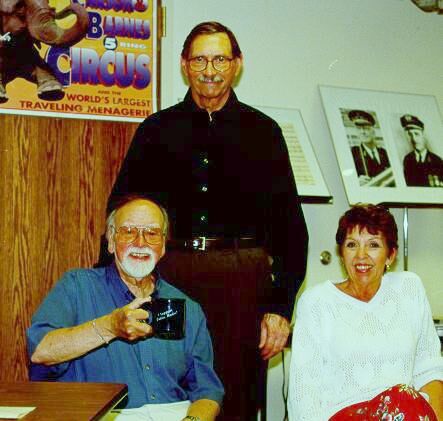
It was raining during a fair in southwest Iowa and the band was sitting around with nothing to do. By this time on the road they had seen the show so many times that they knew all the lines. One of the acts was a comedy routine by two men inside a bull outfit. Karl and another band member pulled a blanket over themselves and baritone player Ed Wosky played the part of the toreador. The rest of the band watched and laughed as the three did the entire Bolivar the Bull routine. Karl went to his tent and wrote the Bolivar march (dedicated to Ed Wosky) which was performed the next day.
Karl once told Carl Holvick,
I'm probably the least educated member of the Iowa Bandmasters Association.
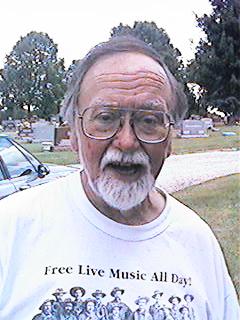 |
I once wrote a march called The Grandstand and
Mr. King was kind enough to play it in the grandstand at the Buena Vista
County Fair in Alta. As he began to announce it a train whistle
blew. He paused and when he opened his mouth to try again the
whistle blew again. It was as if the engineer was watching
Karl.
Karl eventually announced, I see the train is on time. And they haven't improved the schedule one bit! |
The band was rushing. Mr. King said,
You guys determine what tempo you want. I can conduct any damn tempo.
During one number there was a loud cymbal crash where one didn't belong.
Now, who did that? He asked as if he didn't know.
The King Band was invited to perform on the Capital steps in Washington D.C. as part of the bicentennial celebration. Mr. Will Green was the conductor then. It was extremely hot and humid on those steps, so a capital policeman advised Mr. Green that he better have the band remove their uniform coats. Mr. Green replied that the King Band would play with their coats on. The King Band under Karl had a rule that they would always perform in uniform.
A half hour later the policeman returned and said that he had spoken with the six doctors who were treating the heatstroke cases at the capital that day, and they all thought the band better take off their coats.
This is not a request; this is an order! he said.
The King Band performed without their coats.